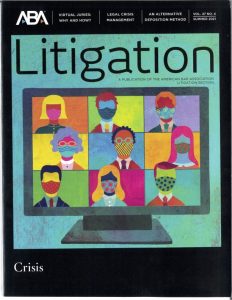 In late 2020, Ashish Joshi, the editor of Litigation—the American Bar Association’s preeminent journal in the field of trial practice—convened a panel to discuss how courts handle parental alienation issues. I was privileged to be one of the three panel members. Also on the panel were two judges. Judge Elizabeth Gleicher is a recipient of the State Bar of Michigan Champion of Justice Award and sits on the Michigan Court of Appeals. Judge Kristina Karle is a former prosecutor with experience in domestic violence and child abuse cases at the Monroe County, New York, District Attorney’s Office and presides in the Ontario County, New York, court.
In late 2020, Ashish Joshi, the editor of Litigation—the American Bar Association’s preeminent journal in the field of trial practice—convened a panel to discuss how courts handle parental alienation issues. I was privileged to be one of the three panel members. Also on the panel were two judges. Judge Elizabeth Gleicher is a recipient of the State Bar of Michigan Champion of Justice Award and sits on the Michigan Court of Appeals. Judge Kristina Karle is a former prosecutor with experience in domestic violence and child abuse cases at the Monroe County, New York, District Attorney’s Office and presides in the Ontario County, New York, court.
A transcript of this discussion was published in the Summer 2021 issue of ABA’s Litigation. Joshi’s outstanding article is must reading for lawyers, judges, parents, and mental health professionals.
The article covers a wide range of issues including:
• the devastating effects of parental alienation on targeted parents
• tips for ensuring that a proper trial record is made for successful appellate review
• the importance of educating courts on the dynamics of child abuse and parental alienation
• common myths that can compromise judicial outcomes
• the danger of judicially enabled parental alienation
• the effectiveness of court-ordered psychotherapy
• payoffs and pitfalls when judges appoint attorneys to represent minor children
• the role of the child’s stated preferences in custody cases
• the fallacy of ignoring parental alienation concerns when an alienated child is performing well in school and social spheres.
I covered the last point in my article on “Ten Parental Alienation Fallacies That Compromise Decisions in Court and in Therapy,” but I especially welcomed Judge Karle’s contribution drawing on her experience as a child abuse and domestic violence prosecutor: “I had countless cases in which a child was regularly abused, yet excelled at school, got straight As. They could control their grades; they could not control the abuse. . . . We have to be very careful not to just reject concerns about high-performing children, thinking that if they are doing great in school, no abuse could be occurring. We’ve got to dig deeper.”
Judge Karle’s recognition of parental alienation as abuse, and the need for courts to rapidly impose consequences when court orders are flouted, is further evidence that advocates for victims of domestic violence and child abuse make a huge mistake when they reject the reality of parental alienation concerns. When a former prosecutor of family violence recognizes parental alienation as child abuse, isn’t it time for DV advocates to rethink their rigid dismissal of the concept of parental alienation and its value to family courts?
On the pitfalls of empowering alienated children with a court-appointed lawyer, Judge Gleicher observed, “We know in the criminal law context that the decisions adolescents make—even 17-and-a-half-year-olds—are not subject to the same review as those of adults. So why, in the family law context, do we suddenly forget those lessons and say to adolescent children we’re going to give you a lawyer so you can bring your craziness right into court and you can have an equal voice with everybody else. It just makes no sense.”
In my concluding remarks, I expressed the hope for “greater awareness in society of PA, with a corresponding ethos that discourages parents from, and condemns them for, engaging in alienating behavior.”
